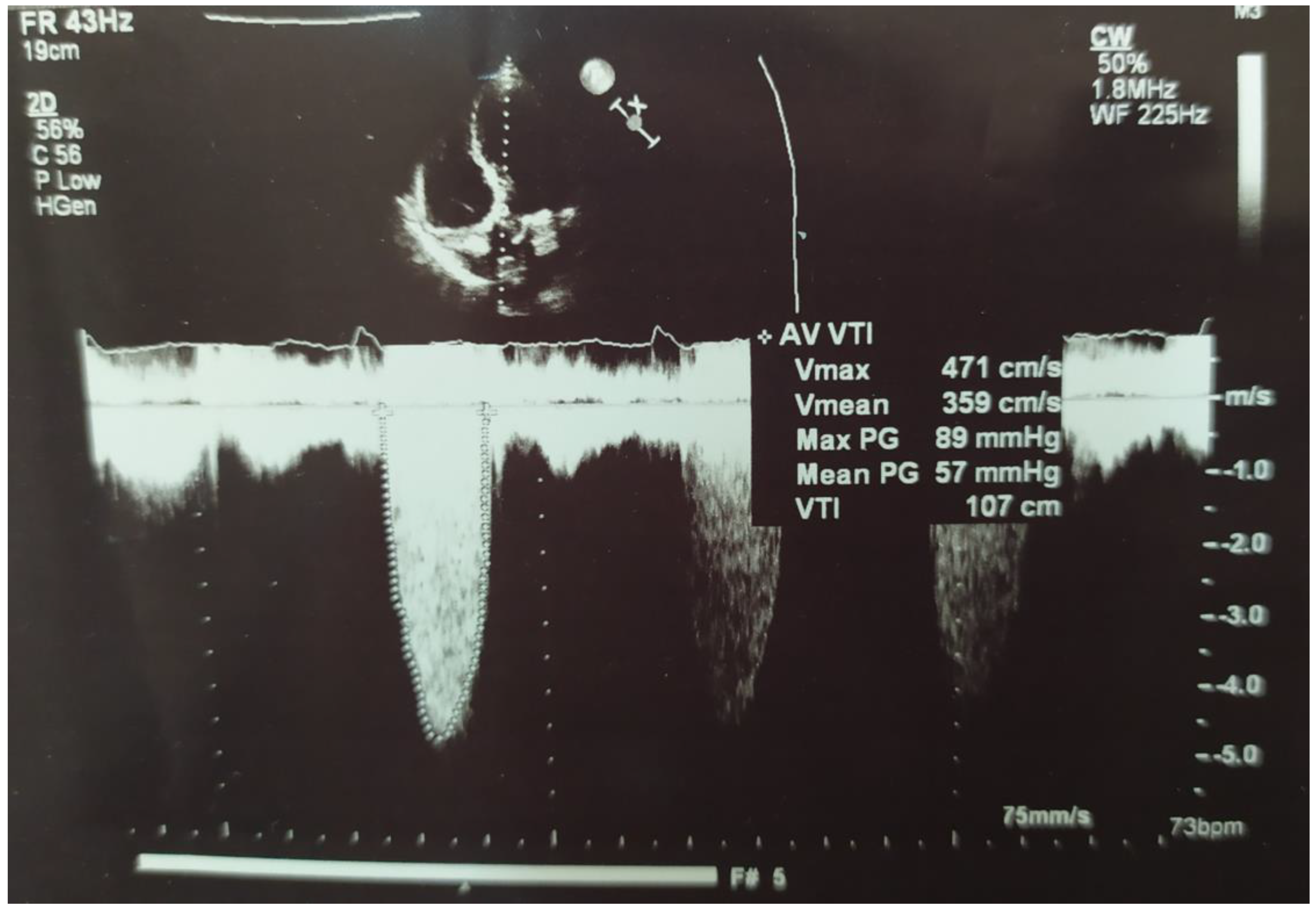Candida parapsilosis Endocarditis: Report of Cases and Review of the Literature
Abstract
Introduction
Case reports
Discussion
| MICs (μg/mL) | Patient 1 | Patient 2 |
|---|---|---|
| Fluconazole | 2 | ≤1 |
| Voriconazole | ≤0.12 | ≤1 |
| Caspofungin | 1 | NP |
| Micafungin | 0.5 | NP |
| Amphotericin B | 0.5 | 1 |
| Flucytosine | ≤1 | ≤1 |
Conclusions
Author Contributions
Funding
Informed Consent Statement
Conflicts of Interest
References
- Baddley, J.W.; Benjamin, D.J., Jr.; Patel, M.; et al. Candida infective endocarditis. Eur. J. Clin. Microbiol. Infect. Dis. 2008, 27, 519–529. [Google Scholar] [CrossRef] [PubMed]
- Bor, D.H.; Woolhandler, S.; Nardin, R.; Brusch, J.; Himmelstein, D.U. Infective endocarditis in the U.S., 1998–2009: A nationwide study. PLoS ONE. 2013, 8, e60033. [Google Scholar] [CrossRef] [PubMed]
- Benjamin, D.K., Jr.; Miro, J.M.; Hoen, B.; et al. Candida endocarditis: Contemporary cases from the International Collaboration of Infectious Endocarditis Merged Database (ICE-mD). Scand. J. Infect. Dis. 2004, 36, 453–455. [Google Scholar] [CrossRef]
- Giuliano, S.; Guastalegname, M.; Russo, A.; et al. Candida endocarditis: Systematic literature review from 1997 to 2014 and analysis of 29 cases from the Italian Study of Endocarditis. Expert Rev. Anti. Infect. Ther. 2017, 15, 807–818. [Google Scholar] [CrossRef]
- Nasser, R.M.; Melgar, G.R.; Longworth, D.L.; Gordon, S.M. Incidence and risk of developing fungal prosthetic valve endocarditis after nosocomial candidemia. Am. J. Med. 1997, 103, 25–32. [Google Scholar] [CrossRef]
- Pappas, P.G.; Kauffman, C.A.; Andes, D.R.; et al. Executive summary: Clinical practice guideline for the management of candidiasis: 2016 update by the Infectious Diseases Society of America. Clin. Infect. Dis. 2016, 62, 409–417. [Google Scholar] [CrossRef]
- Ammannaya, G.K.K.; Sripad, N. Fungal endocarditis: What do we know in 2019? Kardiol. Pol. 2019, 77, 670–673. [Google Scholar] [CrossRef]
- Pfaller, M.A.; Diekema, D.J.; Rinaldi, M.G.; et al. Results from the ARTEMIS DISK Global Antifungal Surveillance Study: A 6.5-year analysis of susceptibilities of Candida and other yeast species to fluconazole and voriconazole by standardized disk diffusion testing. J. Clin. Microbiol. 2005, 43, 5848–5859. [Google Scholar] [CrossRef]
- Paramythiotou, E.; Frantzeskaki, F.; Flevari, A.; Armaganidis, A.; Dimopoulos, G. Invasive fungal infections in the ICU: How to approach, how to treat. Molecules 2014, 19, 1085–1119. [Google Scholar] [CrossRef]
- Tóth, R.; Nosek, J.; Mora-Montes, H.M.; et al. Candida parapsilosis: From genes to the bedside. Clin. Microbiol. Rev. 2019, 32, e00111-18. [Google Scholar] [CrossRef] [PubMed]
- Pammi, M.; Holland, L.; Butler, G.; Gacser, A.; Bliss, J.M. Candida parapsilosis is a significant neonatal pathogen: A systematic review and meta-analysis. Pediatr Infect Dis J. 2013, 32, e206–e216. [Google Scholar] [CrossRef] [PubMed]
- Harrington, R.; Kindermann, S.L.; Hou, Q.; Taylor, R.J.; Azie, N.; Horn, D.L. Candidemia and invasive candidiasis among hospitalized neonates and pediatric patients. Curr. Med. Res. Opin. 2017, 33, 1803–1812. [Google Scholar] [CrossRef]
- Meletiadis, J.; Curfs-Breuker, I.; Meis, J.F.; Mouton, J.W. In vitro antifungal susceptibility testing of Candida isolates with the EUCAST methodology, a new method for ECOFF determination. Antimicrob. Agents Chemother. 2017, 61, e02372-16. [Google Scholar] [CrossRef] [PubMed]
- Pfaller, M.A.; Moet, G.J.; Messer, S.A.; Jones, R.N.; Castanheira, M. Candida bloodstream infections: Comparison of species distributions and antifungal resistance patterns in community-onset and nosocomial isolates in the SENTRY Antimicrobial Surveillance Program, 2008–2009. Antimicrob. Agents Chemother. 2011, 55, 561–566. [Google Scholar] [CrossRef] [PubMed]
- Govender, N.P.; Patel, J.; Magobo, R.E.; et al. Emergence of azole-resistant Candida parapsilosis causing bloodstream infection: Results from laboratory-based sentinel surveillance in South Africa. J. Antimicrob. Chemother. 2016, 71, 1994–2004. [Google Scholar] [CrossRef]
- Lupetti, A.; Tavanti, A.; Davini, P.; et al. Horizontal transmission of Candida parapsilosis candidemia in a neonatal intensive care unit. J. Clin. Microbiol. 2002, 40, 2363–2369. [Google Scholar] [CrossRef]
- Garzoni, C.; Nobre, V.A.; Garbino, J. Candida parapsilosis endocarditis: A comparative review of the literature. Eur. J. Clin. Microbiol. Infect. Dis. 2007, 26, 915–926. [Google Scholar] [CrossRef]
- Muñoz, P.; Vena, A.; Valerio, M.; et al. Risk factors for late recurrent candidaemia. A retrospective matched case-control study. Clin. Microbiol. Infect. 2016, 22, 277.e11–277.e2.77E20. [Google Scholar] [CrossRef]
- Russo, A.; Falcone, M.; Picciarella, A.; Giuliano, S.; Raponi, G.; Venditti, M. Candidaemia after heart valve replacement surgery: Recurrence as prosthetic valve endocarditis is an expected over one-year complication. Clin. Microbiol. Infect. 2016, 22, 466–467. [Google Scholar] [CrossRef]
- Rivoisy, C.; Vena, A.; Schaeffer, L.; et al. Prosthetic valve Candida spp. endocarditis: New insights into long-term prognosis-the ESCAPE study. Clin. Infect. Dis. 2018, 66, 825–832. [Google Scholar] [CrossRef]
- Pai, M.P. Antifungal combinations against simulated Candida albicans endocardial vegetations. Antimicrob. Agents Chemother. 2009, 53, 2629–2631. [Google Scholar] [CrossRef] [PubMed]
- Smego, R.A., Jr.; Ahmad, H. The role of fluconazole in the treatment of Candida endocarditis: A meta-analysis. Medicine 2011, 90, 237–249. [Google Scholar] [CrossRef] [PubMed]

© GERMS 2020.
Share and Cite
Ioannou, P.; Volosyraki, M.; Mavrikaki, V.; Papakitsou, I.; Mathioudaki, A.; Samonis, G.; Kofteridis, D.P. Candida parapsilosis Endocarditis: Report of Cases and Review of the Literature. Germs 2020, 10, 254-259. https://doi.org/10.18683/germs.2020.1214
Ioannou P, Volosyraki M, Mavrikaki V, Papakitsou I, Mathioudaki A, Samonis G, Kofteridis DP. Candida parapsilosis Endocarditis: Report of Cases and Review of the Literature. Germs. 2020; 10(3):254-259. https://doi.org/10.18683/germs.2020.1214
Chicago/Turabian StyleIoannou, Petros, Maria Volosyraki, Vasiliki Mavrikaki, Ioanna Papakitsou, Anna Mathioudaki, George Samonis, and Diamantis P Kofteridis. 2020. "Candida parapsilosis Endocarditis: Report of Cases and Review of the Literature" Germs 10, no. 3: 254-259. https://doi.org/10.18683/germs.2020.1214
APA StyleIoannou, P., Volosyraki, M., Mavrikaki, V., Papakitsou, I., Mathioudaki, A., Samonis, G., & Kofteridis, D. P. (2020). Candida parapsilosis Endocarditis: Report of Cases and Review of the Literature. Germs, 10(3), 254-259. https://doi.org/10.18683/germs.2020.1214




